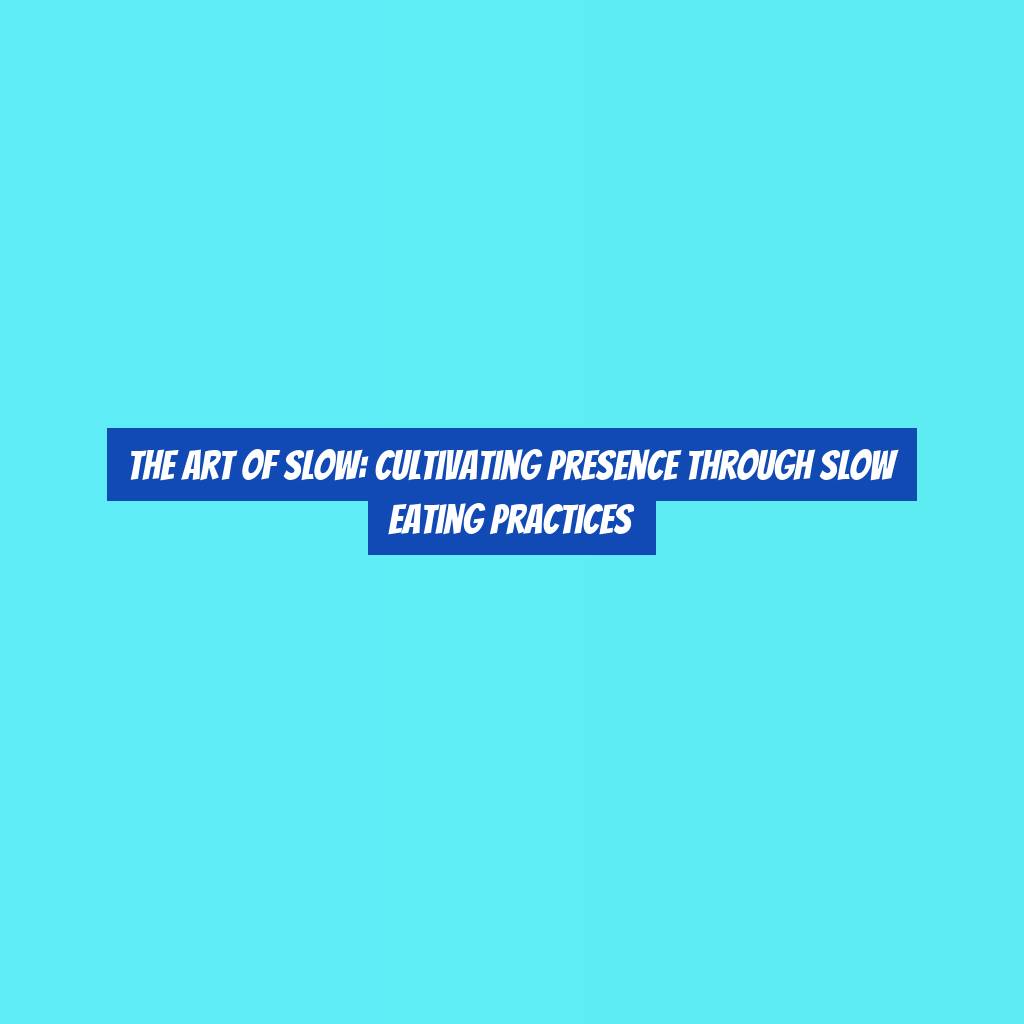The Art of Slow: Cultivating Presence through Slow Eating Practices
Imagine your life as a symphony, with each meal serving as a carefully composed note. In a world that moves at a relentless pace, the art of slow eating offers a harmonious pause, allowing you to savor each morsel and cultivate a deeper sense of presence.
But why does it matter? How does it go beyond just the act of consuming food? You may be surprised to discover the profound impact slow eating can have on your overall well-being, from enhancing digestion to fostering a greater connection with the food on your plate.
The Importance of Slow Eating
To truly appreciate the benefits of slow eating, you must understand its impact on your overall well-being. When you eat slowly, you give your body and mind the opportunity to fully experience and process the act of eating.
By taking the time to savor each bite, you allow your digestive system to function more effectively. Chewing food thoroughly helps in breaking down the food into smaller particles, making it easier for your body to absorb and digest nutrients. This can lead to better nutrient absorption, improved digestion, and reduced digestive discomfort.
Additionally, slow eating allows you to be more mindful of your food choices and portion sizes. It gives your brain the chance to register feelings of fullness, preventing overeating and promoting better weight management.
Moreover, slow eating promotes a sense of relaxation and enjoyment during meals, reducing stress and enhancing overall satisfaction with your dining experience.
Mindful Eating and Well-being
When you practice mindful eating, you can cultivate a deeper connection with your food and enhance your overall well-being. By engaging in this intentional approach to eating, you become more attuned to the sensory experience of food, including its taste, texture, and aroma. This heightened awareness allows you to savor each bite, leading to a greater sense of satisfaction and fulfillment from your meals.
Mindful eating also promotes better digestion and can help prevent overeating by allowing you to recognize feelings of fullness more easily. This can support weight management and reduce the likelihood of digestive discomfort. Additionally, paying close attention to your food and the act of eating can bring a sense of calm and tranquility to your meals, reducing stress and promoting a more relaxed state of mind.
In terms of overall well-being, the practice of mindful eating can contribute to a healthier relationship with food, fostering a positive mindset and reducing anxiety or guilt associated with eating. It can also encourage mindful decision-making when it comes to food choices, leading to a more balanced and nourishing diet. By approaching meals with mindfulness, you can create a more harmonious and joyful relationship with food, ultimately promoting your well-being.
Impact on Digestion and Satiety
Enhancing your well-being through mindful eating involves fostering a heightened awareness of your foodG??s sensory experience, which can positively impact your digestion and sense of satiety. When you eat slowly and mindfully, you give your body the chance to properly digest and absorb nutrients from the food. Chewing your food thoroughly aids in the breakdown of food particles, making it easier for your body to extract nutrients and energy. This can lead to reduced digestive discomfort such as bloating and indigestion.
Additionally, slow eating allows your body to send signals of fullness to your brain, promoting a greater sense of satiety. By savoring each bite and being attuned to your bodyG??s hunger and fullness cues, youG??re more likely to recognize when youG??re satisfied, preventing overeating. This can be particularly beneficial for weight management and overall health.
In contrast, eating quickly can lead to overeating as your body doesnG??t have enough time to signal fullness before youG??ve consumed more than you need. This can contribute to digestive issues and discomfort, as well as potentially lead to weight gain. Therefore, embracing slow eating practices can significantly improve your digestion and enhance your overall sense of satiety.
Practical Tips for Slow Eating
Try incorporating mindful eating by taking smaller bites and putting your utensils down between each one. This simple practice can help you slow down and savor your food, allowing you to fully experience each bite.
Here are some practical tips for embracing slow eating:
-
Chew your food thoroughly: Take the time to chew each bite thoroughly before swallowing. This not only aids in digestion but also allows you to appreciate the flavors and textures of your food.
-
Remove distractions: Turn off the TV, put away your phone, and focus solely on your meal. Eliminating distractions can help you be more present and attentive while eating.
-
Use all your senses: Engage all your senses by paying attention to the colors, smells, textures, and tastes of your food. This can enhance your overall eating experience.
-
Take breaks: Pause midway through your meal to check in with your hunger and fullness cues. This can prevent overeating and help you connect with your bodyG??s signals.
-
Practice gratitude: Before starting your meal, take a moment to express gratitude for the food in front of you. Cultivating a sense of appreciation can deepen your connection to the act of eating.
Cultivating Presence Through Slow Eating
Embrace the practice of cultivating presence through slow eating to fully engage with your meal and experience the nourishment it provides. When you slow down and savor each bite, you create an opportunity to be fully present in the moment. This mindful approach allows you to appreciate the flavors, textures, and aromas of your food in a way that canG??t be experienced when rushing through a meal. By focusing on the act of eating, you become more attuned to your bodyG??s hunger and fullness cues, leading to a greater understanding of your nutritional needs.
Cultivating presence through slow eating also enables you to form a deeper connection with your food. You become more aware of where your food comes from, how it was prepared, and the effort that went into bringing it to your table. This awareness can foster a sense of gratitude for the nourishment provided by the earth and those who contributed to the mealG??s creation.
Additionally, slowing down and savoring each bite can enhance the social aspect of dining, allowing for meaningful conversations and shared experiences with loved ones.
Incorporating slow eating practices into your routine can lead to a more mindful and fulfilling relationship with food, promoting overall well-being and a deeper appreciation for the nourishment that sustains you.
Conclusion
So, next time you sit down for a meal, remember to take it slow. By cultivating presence through slow eating practices, you can improve your well-being, digestion, and overall satisfaction with your meals.
Mindful eating not only nourishes your body, but also your mind and spirit. So, savor each bite, chew slowly, and embrace the art of slow eating for a more fulfilling and enriching dining experience.






